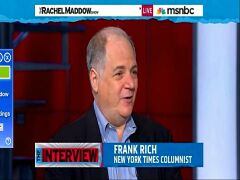Frank Rich Goes to the Movies, Finds Another Silly Political Metaphor
Only the overdramatic columnist Frank Rich could find a political message in a Western remake: "The double-barreled success of 'True Grit,' then and now, spreads well beyond those conservative gunslingers. In our current winter of high domestic anxiety, as in the politically tumultuous American summer of 1969, it is a hit with the national mass audience and elite critics alike. The new version is doing as well in New York and Los Angeles as in red Cheneyland."
Published: 1/24/2011 3:50 PM ET
In his latest allegedly political column on Sunday, "The One-Eyed Man Is King," the paper's former drama critic Frank Rich pondered the surprise success of the Coen Brothers' remake of the John Wayne western "True Grit" and what it says about America today. The results are as silly as you'd suspect, though this latest metaphorical overreach isn't as excruciating as was Rich's Wall Street saga last November involving, um, bachelors and dwarves.

A month before John Wayne won the 1969 Best Actor Oscar for "True Grit," Richard Nixon wrote him a "Dear Duke" fan letter from the Oval Office: "I saw it in the W.H. with my family and for once we agree with the critics - you were great!" Some four decades later, his rave was echoed by another Republican warrior, this time in praise of the "True Grit" remake with Jeff Bridges in the role of the old, fat, hard-drinking, half-blind 19th-century United States marshal Rooster Cogburn. Shortly after New Year's, Liz Cheney told The Times that her parents saw "True Grit" at the Teton Theater in Jackson, Wyo., and gave it "two thumbs up."While comparing 1969 America to today, Rich took an unusual nostalgic turn in order to push his liberalism.
The double-barreled success of "True Grit," then and now, spreads well beyond those conservative gunslingers. In our current winter of high domestic anxiety, as in the politically tumultuous American summer of 1969, it is a hit with the national mass audience and elite critics alike. The new version is doing as well in New York and Los Angeles as in red Cheneyland.
That kind of legal and moral cost-accounting seems as distant as a tintype now. The new "True Grit" lands in an America that's still not recovered from a crash where many of the reckless perpetrators of economic mayhem deflected any accountability and merely moved on to the next bubble, gamble or ethically dubious backroom deal. When Americans think of the law these days, they often think of a system that can easily be gamed by the rich and the powerful, starting with those who pillaged Lehman Brothers, A.I.G. and Citigroup and left taxpayers, shareholders and pensioners in the dust. A virtuous soul like Mattie would be crushed in a contemporary gold rush even if (or especially if) she fought back with the kind of civil action so prized by the 19th-century Mattie.


